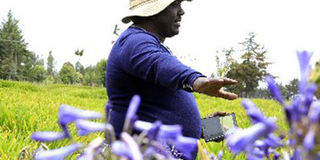Trade deal put off as Dar, Burundi balk

Peter Gachanja at his flower farm in North Kinang'op on September 9, 2016. EU is a big importer of flowers. PHOTO | DIANA NGILA | NATION MEDIA GROUP
What you need to know:
- In July, Members of the European Parliament had indicated they would be rooting for an extension of the October deadline to let Kenya lobby her neighbours to sign the deal.
- Kenya and Rwanda were the first to sign the agreement in Brussels, while Uganda had shown willingness to sign it.
The East African Community has put off the signing of the Economic Partnership Agreement after Tanzania and Burundi backtracked on a regional trade deal with the European Union.
East African Heads of States meeting in Dar es Salaam, Tanzania, on Thursday resolved to postpone the signing to January 1, 2017 instead of the October 2016 deadline after Tanzania insisted on a delay pending discussions on how the deal would effect the region’s manufacturing.
The regional bloc will communicate the decision to the European Union. Kenya will ask to be spared the heavy taxes before the new deadline.
In July, Members of the European Parliament had indicated they would be rooting for an extension of the October deadline to let Kenya lobby her neighbours to sign the deal.
Deputy President William Ruto who represented Kenya, made the country’s case before four East African countries in an attempt to resolve an impasse that will allow tax-free exports to Europe.
“Backtracking on the agreement will erode the credibility the region has built over the last 20 years and negatively affect prospective trade arrangements with other countries,” Mr Ruto said.
Kenya and Rwanda were the first to sign the agreement in Brussels, while Uganda had shown willingness to sign it.
The Deputy President met three Heads of States and a Burundian Minister in Dar es Salaam in a bid to convince Tanzania and Burundi to sign the agreement.
He, said it would be dangerous for the region to adopt different trade styles by failing to sign.
The two countries have been the biggest barriers to the deal. Tanzania argues that it was analysing it.
Burundi on the other hand is furious after European countries placed an aid embargo following its disputed elections won by Pierre Nkurunziza and the violence that followed it.
The deals were negotiated for 14 years and allow East Africa to export its products, mainly flowers and perishable goods, to Europe tax free.
Kenya is the only country that is not classified as least developed. It depends on the agreement to enjoy tax free access to the lucrative European Union market.
It narrowly survived being kicked out of the trade preferences after the European Parliament started talks last month leading to the signing in Brussels together with Rwanda.
“We went to Brussels to present our case because Kenya was on the verge of being taken out of the market. We will not allow Kenya to suffer because of dynamics from other states. We have a provision that allows member states to sign at different times,” Industrialisation Cabinet Secretary Adan Mohamed told the Nation on the eve of the summit.
Under the trade deal, EU would get unlimited market access to the bloc for the next two and half decades.
Kenya will also not pay the 8-12 per cent taxes while selling goods to Europe.





